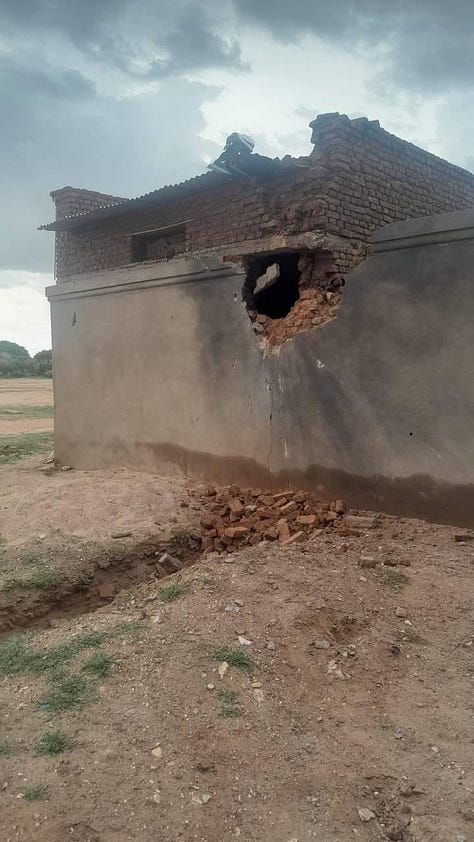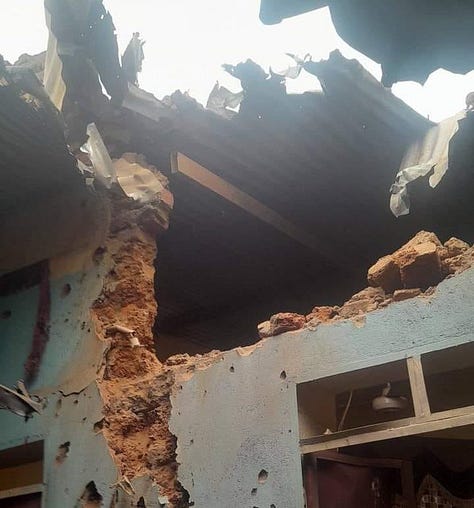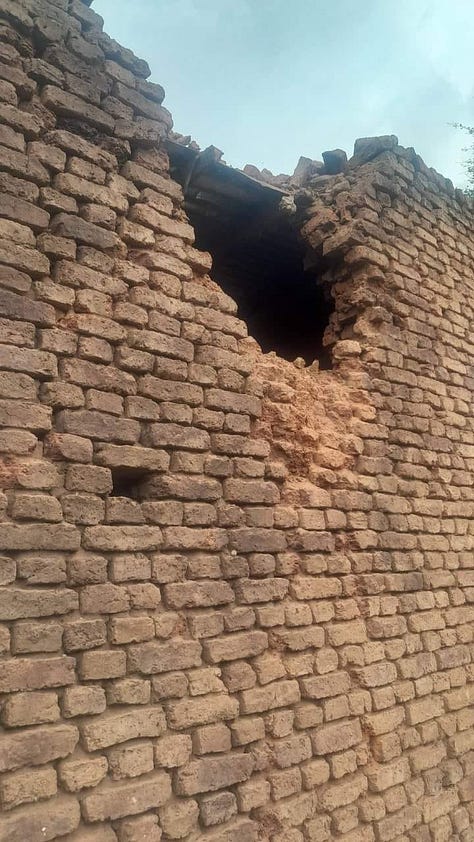Five days of fighting in Nyala threaten larger Darfur exodus
SAF threatens airstrikes along Al Obeid-Khartoum road



Five days of fighting in Nyala have paralyzed civilian life and caused thousands of residents to flee outside the city, amid shortages of basic food commodities in the markets, disruptions to heath care, and civilian deaths and injuries.
The fighting involves the 16th Infantry Division, headquartered in the heart of the city and the Rapid Support Forces (RSF) led by Mohamad Hamdan Dagalo.
Nyala, the capital of South Darfur, is the second most populous city in Sudan (after the metropolitan capital region of Khartoum-Omdurman-Bahri) with a population of about 800,000 to 1 million by some estimates.
Fighting in Darfur’s urban centers threatens a larger displacement crisis than occurred even during the last Darfur war. That conflict, which began in 2003 and ended in 2020, was confined largely to rural areas, and the government succeeded in maintaining control of the major market centers and population centers of the region.
By contrast, in this war that began in April 2023, the RSF have taken control of the capitals of West, Central, and East Darfur, and they partially control Nyala and all the rural areas around Nyala. The rapid collapse of government authority in many parts of western Darfur has plunged the economy into a dire situation. Insecurity along important commercial routes, dysfunction in the banking sector, and attacks on physical markets are stoking displacement even from areas not immediately affected by fighting. Some central state institutions are barely functioning or teetering on the brink of collapse, and government salaries have not been paid.
Food aid and other forms of humanitarian assistance are more limited than in years past; World Food Programme stockpiles in Al Obeid were looted, and humanitarian offices in Al Jeneina and other cities were ransacked.
Mitigating factors include the absence of fighting in certain cities that fell to the RSF quickly with little or no SAF resistance, such as Ad Daien, and the neutrality of the Juba Peace Signatories (the former Darfur rebels) under the leadership of Darfur Regional Governor and Sudan Liberation Army commander Minni Minawi.
Minawi is based in Al Fasher with a large joint force of the Juba Peace Signatories, and that city has remained a pocket of greater stability, in spite of occasional clashes involving the RSF and SAF, which are also both present in the city.
Nyala fighting
The fighting that began last week in Nyala has killed at least 13 civilians and continued with varying intensity through Monday, July 24. Multiple local media reported that the fighting began after the RSF deployed forces near the 16th Division headquarters. Darfur 24, citing local residents, reported Monday, July 24, “the Rapid Support Forces attempted to infiltrate the areas adjacent to the army command.”
Similarly, freelance journalist Eisa Dafallah said on Saturday, July 22, “Rapid Support is trying to control the leadership of the 16th Infantry Division in Nyala.” He downplayed the chances that they could capture the base, citing its natural defenses and entrenchments, and the skill of the division commander. Dafallah added that a large number of retired soldiers have rejoined the army in Nyala, reinforcing the base.
The Darfur Bar Association condemned the fighting in a statement Sunday, July 23:
Mutual indiscriminate shelling operations continued between the army and the RSF in the city of Nyala yesterday, Saturday, until 10 am today, Sunday. According to preliminary statistics, the number of victims yesterday was 13 dead and dozens of wounded and missing persons.
There are also victims shot by sniper bullets, there are no preliminary statistics for their numbers, and there are bodies dumped in some places. According to the reports, the Rapid Support took positions inside residential neighborhoods, and the army bombed from far away, which led to an increase in the loss of life.
The Association affirms that the direction of the Rapid Support Forces to take the cities of the states of Darfur as main areas of operations for its war activities will lead to wars between the components of Darfur's civil society and the spread of chaos throughout the Darfur region.
The Commission renews its demands to stop the absurd war and to remove military installations from the neighborhoods and homes of citizens. It also holds all the participants in the ongoing hostilities and their leaders responsible for loss of the lives of innocent citizens.
A number of homes were damaged or destroyed in the fighting. Darfur 24 said that most of the injuries were among the citizens in the neighborhoods of Karari, Al-Wadi, Al-Jeer, and Al-Sikka Al-Hadid.
Nyala services cut
Most of Nyala’s hospitals stopped functioning in recent days, and the dialysis center in the city had to cut back services, medical sources in Nyala told Beam Reports.
“The city is under an acute health crisis after the majority of hospitals were out of service, due to the continuation of clashes for the fourth consecutive day, between the army and the Rapid Support Forces,” the Sudanese news service reported yesterday, July 23. The hospitals were also facing “high pressure with an increasing number of wounded as a result of military clashes.”
Telecommunications networks also suffered some outages during the fighting.
Al Obeid clashes
Recent days have also seen renewed clashes in the western city of Al Obeid in North Kordofan, including on both Thursday and Friday last week. Gun battles and shells that fell in several neighborhoods of the city killed and wounded several civilians.
Unusually, government warplanes also targeted positions of the RSF in the southern and western outskirts of the city on both days. Sudan’s air force has previously focused mostly on the capital region.
Sudan’s Minister of Cabinet Affairs Othman Hussein Othman announced today the closure of the road between Al Obeid and Khartoum. Sudan News Agency quoted Othman as saying that the RSF are using the road to “transfer the RSF’s loot and bring in the mercenaries.”
He said travelers should instead travel to Khartoum via Kosti.
Following up on this decision, the Sudan Armed Forces announced that they will consider any vehicles on the road as hostile: “The Armed Forces note that they will deal with all types of vehicles on this road as military targets for destruction.”

